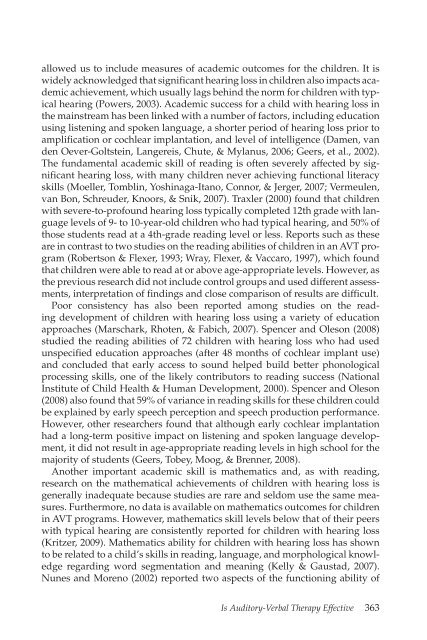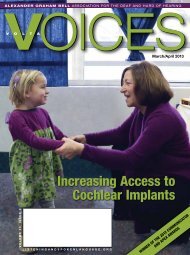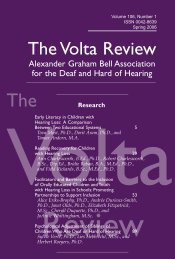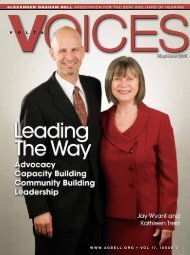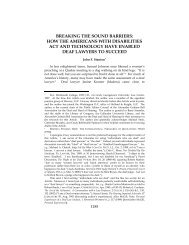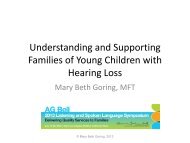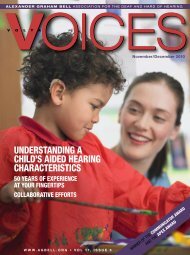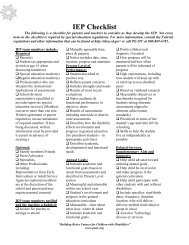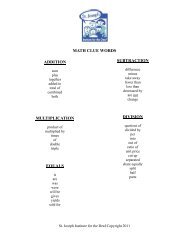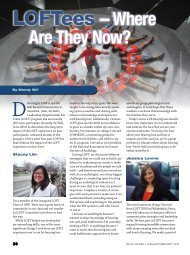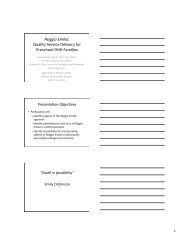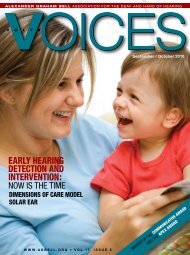Download this issue - Alexander Graham Bell Association
Download this issue - Alexander Graham Bell Association
Download this issue - Alexander Graham Bell Association
Create successful ePaper yourself
Turn your PDF publications into a flip-book with our unique Google optimized e-Paper software.
allowed us to include measures of academic outcomes for the children. It is<br />
widely acknowledged that significant hearing loss in children also impacts academic<br />
achievement, which usually lags behind the norm for children with typical<br />
hearing (Powers, 2003). Academic success for a child with hearing loss in<br />
the mainstream has been linked with a number of factors, including education<br />
using listening and spoken language, a shorter period of hearing loss prior to<br />
amplification or cochlear implantation, and level of intelligence (Damen, van<br />
den Oever-Goltstein, Langereis, Chute, & Mylanus, 2006; Geers, et al., 2002).<br />
The fundamental academic skill of reading is often severely affected by significant<br />
hearing loss, with many children never achieving functional literacy<br />
skills (Moeller, Tomblin, Yoshinaga-Itano, Connor, & Jerger, 2007; Vermeulen,<br />
van Bon, Schreuder, Knoors, & Snik, 2007). Traxler (2000) found that children<br />
with severe-to-profound hearing loss typically completed 12th grade with language<br />
levels of 9- to 10-year-old children who had typical hearing, and 50% of<br />
those students read at a 4th-grade reading level or less. Reports such as these<br />
are in contrast to two studies on the reading abilities of children in an AVT program<br />
(Robertson & Flexer, 1993; Wray, Flexer, & Vaccaro, 1997), which found<br />
that children were able to read at or above age-appropriate levels. However, as<br />
the previous research did not include control groups and used different assessments,<br />
interpretation of findings and close comparison of results are difficult.<br />
Poor consistency has also been reported among studies on the reading<br />
development of children with hearing loss using a variety of education<br />
approaches (Marschark, Rhoten, & Fabich, 2007). Spencer and Oleson (2008)<br />
studied the reading abilities of 72 children with hearing loss who had used<br />
unspecified education approaches (after 48 months of cochlear implant use)<br />
and concluded that early access to sound helped build better phonological<br />
processing skills, one of the likely contributors to reading success (National<br />
Institute of Child Health & Human Development, 2000). Spencer and Oleson<br />
(2008) also found that 59% of variance in reading skills for these children could<br />
be explained by early speech perception and speech production performance.<br />
However, other researchers found that although early cochlear implantation<br />
had a long-term positive impact on listening and spoken language development,<br />
it did not result in age-appropriate reading levels in high school for the<br />
majority of students (Geers, Tobey, Moog, & Brenner, 2008).<br />
Another important academic skill is mathematics and, as with reading,<br />
research on the mathematical achievements of children with hearing loss is<br />
generally inadequate because studies are rare and seldom use the same measures.<br />
Furthermore, no data is available on mathematics outcomes for children<br />
in AVT programs. However, mathematics skill levels below that of their peers<br />
with typical hearing are consistently reported for children with hearing loss<br />
(Kritzer, 2009). Mathematics ability for children with hearing loss has shown<br />
to be related to a child’s skills in reading, language, and morphological knowledge<br />
regarding word segmentation and meaning (Kelly & Gaustad, 2007).<br />
Nunes and Moreno (2002) reported two aspects of the functioning ability of<br />
Is Auditory-Verbal Therapy Effective 363


